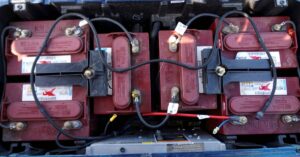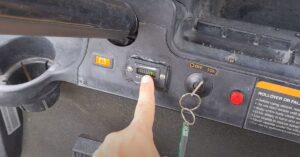Can Golf Cart Batteries Freeze?
Ever wondered how the cold impacts your golf cart battery? You’re not alone. Many golfers find themselves pondering about this, especially during those frosty winter months.
Yes, golf cart batteries can freeze but it largely depends on their state of charge and the exact temperature conditions they are exposed to.
Are you curious as to why this happens and what you can do to prevent it? Stick around! In the next few paragraphs, we’ll dive into the science behind freezing batteries and provide some practical tips for keeping your golf cart running smoothly all year round!
Key Takeaways
- Protect your golf cart batteries from freezing by storing them in a temperature-controlled environment.
- Regularly check the water levels in your batteries and top them up to prevent freezing.
- Invest in battery blankets or insulation kits to provide an added layer of protection during cold weather.
- If you live in an area with harsh winters, consider using deep cycle batteries that are specifically designed to withstand freezing temperatures.
Can golf cart batteries freeze during winter?
Yes, golf cart batteries can freeze during winter. The cold temperatures can cause the battery’s electrolyte solution to freeze, which in turn can lead to damage and reduced performance. It is essential to take precautions to prevent this from happening.
Here are the reasons why golf cart batteries may freeze:
- Lack of insulation: Golf cart batteries are typically located under the seats or in an exposed area where they are not insulated from the elements. This makes them more susceptible to freezing temperatures.
- Poor maintenance: If a battery is not properly maintained, it may have low electrolyte levels or be in poor condition, increasing the likelihood of freezing.
- Inactivity: When a golf cart is not used regularly during winter months, the battery can discharge and become more vulnerable to freezing.
To prevent your golf cart batteries from freezing during winter, here are some steps you can take:
- Keep your batteries charged: Regularly charge your golf cart’s batteries even if you’re not using it frequently. This helps maintain their overall health and prevents them from discharging too much.
- Add insulation: Consider adding insulation around your battery compartment or using thermal blankets specifically designed for protecting batteries from extreme temperatures.
- Maintain proper water levels: Check and refill distilled water as needed to ensure optimal electrolyte levels within each cell of the battery.
What happens to a golf cart battery when it freezes?
Here are some precautions you can take:
- Store your golf cart in a temperature-controlled environment during winter months whenever possible.
- If storing outdoors is unavoidable, use a quality cover specifically designed for protecting batteries from extreme temperatures.
- Keep your batteries fully charged during colder periods as this helps prevent freezing.
- Consider using insulation blankets or heating pads designed for batteries if you frequently operate your golf cart in sub-zero conditions.
- Regularly inspect your batteries for any signs of damage or leakage before and after exposure to freezing temperatures.
How can you prevent your golf cart batteries from freezing?
If you live in an area with cold winters, it’s important to take precautions to prevent your golf cart batteries from freezing. Freezing temperatures can damage the batteries and reduce their lifespan. Here are some simple steps you can take to protect your golf cart batteries during the winter months.
Keep your batteries fully charged
One of the most effective ways to prevent freezing is by keeping your golf cart batteries fully charged. When a battery is fully charged, it has less chance of freezing because the electrolyte solution inside remains diluted.
Store your golf cart in a warm place
If possible, store your golf cart indoors or in a heated garage during the winter. Keeping it away from extreme cold temperatures will help maintain the battery’s performance and prevent freezing.
Use insulation
Insulate the battery compartment with foam or other insulating materials to provide additional protection against cold weather conditions. This can help retain heat generated by the battery and keep it from freezing.
Add antifreeze
Consider adding an antifreeze solution specifically designed for golf cart batteries into each cell before winter sets in. This solution lowers the freezing point of water inside the battery, providing extra protection against freezing.
Are there any signs that indicate a frozen golf cart battery?
If you suspect that your golf cart battery may be frozen, there are some telltale signs to look out for. Let’s dig deeper into these indicators and understand what they mean.
Battery Voltage Drop
A frozen battery will often show a significant drop in voltage. You can check this by using a voltmeter to measure the battery’s voltage. If it reads below the recommended level, it could be due to freezing.
No Power Output
A frozen battery won’t be able to deliver power effectively. If you notice that your golf cart is struggling or unable to start, even after charging, it could indicate a frozen battery.
Distorted Case
Frozen batteries may expand and cause the casing to distort or bulge outward. Inspect your battery closely for any visible signs of swelling or deformation.
Liquid Leakage
Freezing temperatures can cause the electrolyte inside the battery to freeze and expand, leading to leaks from cracks or vents in the case. Check for any fluid leakage around the battery terminals or on the ground beneath it.
Frozen Appearance
In extreme cases, you might physically see ice crystals forming on top of or around the battery terminals when looking at them closely.
What are the consequences of using a frozen golf cart battery?
Using a frozen golf cart battery can have serious consequences for both the battery itself and your overall golf cart performance. Let’s dig deeper into the reasons why:
Reduced Battery Life
Freezing temperatures can cause irreversible damage to the internal components of the battery, leading to reduced capacity and a shorter lifespan. This means you will need to replace your battery more frequently, resulting in additional expenses.
Decreased Power Output
When a battery freezes, its ability to deliver power is compromised. As a result, you may experience sluggish acceleration or find that your golf cart struggles on inclines. This not only affects your overall performance but also hampers your enjoyment on the course.
Potential Safety Hazards
A frozen battery can pose safety risks due to increased pressure build-up inside the cells. In extreme cases, this pressure could cause leakage or even rupture of the battery casing, potentially leading to acid spills or other hazardous situations.
Difficulty Recharging
Frozen batteries often have difficulty accepting a charge properly. Even if you manage to thaw out the battery, it may not regain its full capacity or hold a charge as efficiently as before. This means longer charging times and decreased range per charge cycle.
To avoid these consequences and ensure optimal performance from your golf cart’s battery, it is crucial to take preventive measures during freezing weather conditions such as storing the batteries indoors in warmer environments above freezing temperature thresholds.
FAQs
What happens to golf cart batteries when they freeze?
When golf cart batteries freeze, the electrolyte inside can expand and cause damage to the battery casing. This can lead to cracks or leaks in the battery, reducing its performance and lifespan.
Can freezing temperatures affect the charging capacity of golf cart batteries?
Yes, freezing temperatures can significantly impact the charging capacity of golf cart batteries. Cold weather slows down chemical reactions within the battery, resulting in reduced energy output and decreased overall performance.
How can one prevent golf cart batteries from freezing during winter months?
To prevent golf cart batteries from freezing during winter months, it is important to store them in a temperature-controlled environment where they are protected from extreme cold temperatures. Additionally, using battery blankets or insulation wraps can help provide some level of protection against freezing.
Are there any specific maintenance tips for ensuring that golf cart batteries do not freeze?
Regularly checking and maintaining proper water levels in flooded lead-acid batteries is crucial to preventing freezing as low water levels increase the risk of damage due to expansion during freezing temperatures. It is also advisable to keep your batteries fully charged before storing them for prolonged periods during colder months as this helps protect against freeze-related issues.




